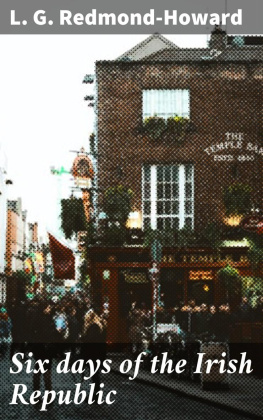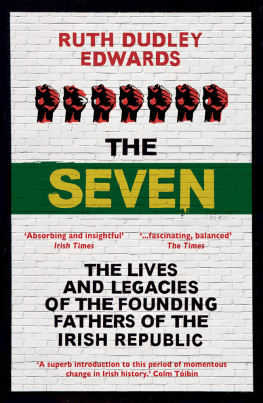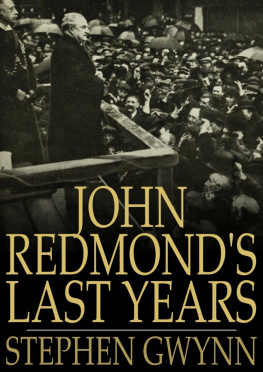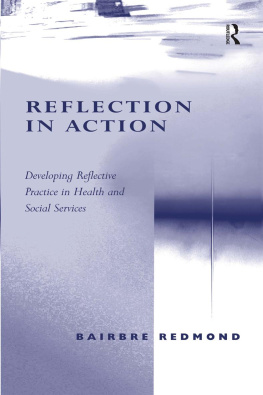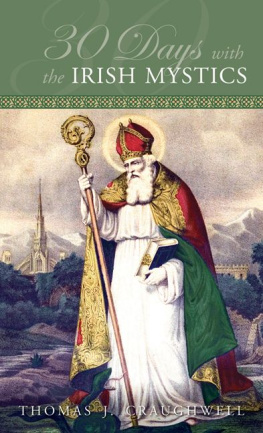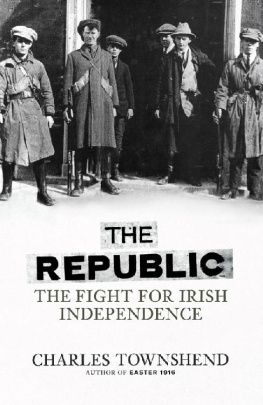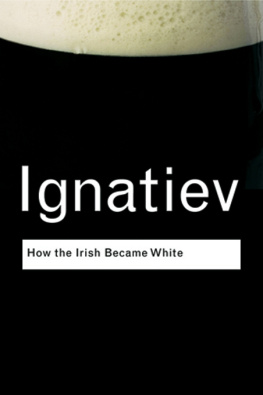CHAPTER THE FIRST
Table of Contents
A BOLT FROM THE BLUE
Table of Contents
Those who were in Dublin on Easter Monday 1916 were privileged to witness a scene which for dramatic setting and for paradoxical conception is certainly the most extraordinary of any of the long line of rebellions in Irish history, for at a time when it seemed almost universally admitted that "Separatism" was from an economic, racial, and military point of view utterly impossible, there suddenly arose without warning, without apparent reason, and as if from nowhere, a body of men, fully armed and completely organized, who within the space of a single hour had captured every strategic point in the capital, and to its utter amazement held it up in the name of a new "Republic," in much the same way as a highwayman of old used to hold up coaches on Hounslow Heath.
It was in very deed a bolt from the blue. The first intimation that the general public got of the rising was the sudden spread of the wildest rumours"Dublin Castle has just been taken by the Irish Volunteers," "The Post Office has been captured by the Sinn Feiners," "Soldiers and police are being shot at sight," "Larkin's Citizen Army are firing on women and children," but, for the most part, these rumours were discredited as impossible, at most being put down as some accidental clash between military and civilians, and it was only as people rushed into the street and heard the stories of the encounters first-hand that they began to realize that anything unusual was taking place.
Bodies of armed men had indeed been remarked in unusually large numbers in the streets all the morning, increasing and concentrating towards twelve, but everyone had grown so accustomed to these demonstrations for the past three years, since they had been inaugurated in Ulster by Sir Edward Carson, that nobody had taken any particular notice.
People merely remarked that it was rather strange, in view of the abandonment of the "Easter manuvres" which had been organized for Sunday, and which had been cancelled at the last moment, late on Saturday night, by special order of Professor Eoin MacNeill, editor of the Irish Volunteer, which ran: "Owing to the very critical position, all orders given to Irish Volunteers for to-morrow, Easter Sunday, are hereby rescinded, and no parades, marches, or other movements of Irish Volunteers will take place. Each individual Volunteer will obey this order strictly in every particular."
It was supposed, therefore, that the numbers were due to the new recruits which had been the outcome of the protest against the deportation of the Sinn Fein leaders some time previous to this, and moderate people hoped that the Sinn Fein authorities were about to show the same discretion in the matter of an armed demonstration in Dublin which the authorities had shown in the matter of the proposed inclusion of the military in the St. Patrick's Day parade in Cork.
Possibly they may have had secret informationfor they had their spies in every departmentthat the long-meditated disarmament had been determined upon, and immediately decided to anticipate the offensive by a strong defensive of their own choosing. At any rate, Monday found them fully prepared, each in his proper place.
Accordingly, on the exact stroke of midday the Volunteers in Sackville Street were suddenly seen to stop short opposite the Post Office. "I was outside the building at the time," said an eye-witness of that now historic event, Mr. E. A. Stoker, the well-known Grafton Street jeweller, "and noticed a mixed crowd of, I should say, roughly, about one hundred men and boys, all armed, and half the number carrying old portmanteaux and parcels of every description. It is said that Connolly was leading.
"He called, 'Halt! Left turn! Come on.' The crowd then ran into the Post Office. I also followed. Several men crossed the counter and held revolvers at the officials' heads.
"One youth, intensely pale and nervous, put a revolver at my breast and said, 'Clear out.'
"I replied, 'What's up?'
"He said, 'Hands up, or I'll blow your heart out.'
"Up went my hands, and he backed me out to the entrance, and within five minutes everyone else had been bundled out in the same unceremonious way, and they were in possession."
Once in possession of the Post Officewhich from its position and character was admirably suited for a general headquartersthe next thing was to fortify the place, for there was no knowing what had happened to the other enterprises which had been timed to take place simultaneously, or when the authorities would send out an armed force for its recapture. Next, a number of shotsall blankwere discharged with the purpose of clearing the streets of sightseers and inquisitive idlers. These had the desired effect, after which floor after floor of the Post Office was systematically occupied, the officials being either placed under arrest or allowed to disperse, as each case suggested fit to the commander, and the air began to reverberate with the sounds of crashing glass and masonry as the lower windows were turned into fortified loopholes with the aid of furniture and bags.
Meanwhile a small group of policemen stood near the Nelson Monument helpless, but one must evidently have telegraphed for help, for within a few minutes a small detachment of mounted lancers came riding up.
People stood breathless in expectation.
The insurgents just allowed the first line to get abreast of the Pillar, and then they opened fire; and at once a couple of saddles were emptied and the rest at once turned and galloped for all they were worth up in the direction of the Rotunda.
One poor fellow was killed outright and a horse shot dead; after which a great cheer went up from the crowd in the G.P.O., who proceeded to take off the harness and carry it in triumph back to headquarters, one of the rebels in uniform taking the young lancer's sword.
Immediately after this a tramway car was blown up with dynamite at the corner of North Earl Street, making a sort of barricade against any possible approach from Amiens Street Station, where the Belfast trains were expected to arrive.
By this time I was on the scene of the crisis myself, having only heard the news on my way into Trinity, which had been quickly occupied by the O.T.C., who were thus able to practically cut the chief line of communication of the rebels and command a huge area of important streets which would otherwise have presented the utmost difficulties to the advance of regular troops.
Only the military were allowed in College, and, anxious to be on the spot at what everybody then expected would be no more than an hour or so's brisk encounter, I took a car to the "Metropole" in order to be present when the Post Office was takenthe hotel actually adjoining and overlooking the building.
My own experience must have been that of thousands of people in Dublin, but I quote it, as I will quote it again, because I can personally testify to it.
Everyone at the hotel was in a state of consternation, for hardly six yards away the windows of the Post Office were crashing to the ground in the street, and at everyone bags of refuse were being piled up, and the muzzles of rifles were commanding all the windows of the hotel guests.


